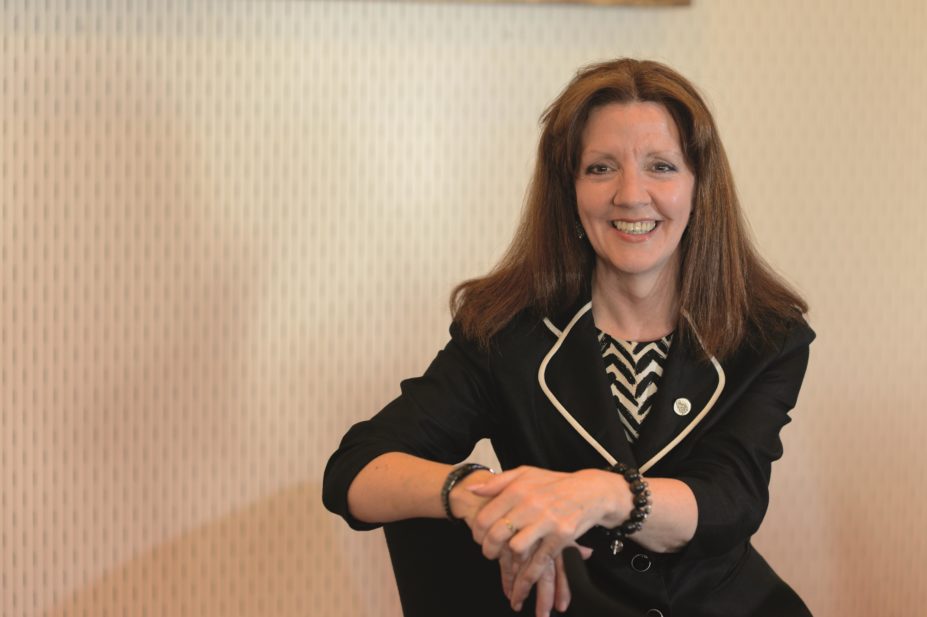
Simon Wright Photography / The Pharmaceutical Journal
When Rose Marie Parr was offered the top pharmacy job in Scotland, it meant leaving an education organisation she had helped develop from the ground up over 13 years.
“I thought long and hard about it,” she says. “Previously I was at NHS Education for Scotland (NES) [as director of pharmacy] and absolutely loved it. Because I’ve got such a passion for education and training, I just loved that job and had a really good team.”
But the lure of such an influential role — as Scotland’s chief pharmaceutical officer (CPO) — proved decisive. “I really wanted to [take the role] for the profession because I think it’s really important to bring the profession together; in some ways, it can be quite siloed. For me, it’s about trying to be more collegiate along the professional route.”
Parr started working for the NHS in Scotland in 1982 as a hospital pharmacist with Lanarkshire Health Board. Thirty-three years later, she has just started her new role at the Scottish government while holding honorary professorships at the Robert Gordon University in Aberdeen and the University of Strathclyde in Glasgow, as well as a seat on the General Pharmaceutical Council’s board of assessors, among other roles.
Route to pharmacy education
Parr’s successful career has been driven by pharmacy education, yet when she started she had no idea that she would end up in this specialism.
“I did my pre-registration training in hospital and for most of my early career I was a hospital pharmacist and did my masters in clinical pharmacy as part of that training,” she says. “I got to the point where I really enjoyed hospital pharmacy.”
As a newly registered pharmacist in 1982, she started by working in a few different roles in Lanarkshire and nearby Forth Valley Health Board. When she progressed into more senior positions, she began developing her passion for pharmacy education and training.
A defining moment came in 1993 when, during a pharmacy professional event, she got talking to a senior member of the Scottish Centre for Pharmacy Postgraduate Education (SCPPE) — “or ‘skippy’ as we called it” — who suggested she could apply for the newly vacant director role.
“That was really lucky because I would have looked at it [the job description] but maybe would have thought I was a bit young for it,” she reflects. “It just shows you that bumping into someone and having an offhand conversation can change your life.
“That was definitely where I thought my career changed.”
The role kick-started her involvement in national pharmacy education and training, and for the next ten years Parr reported directly to the Scottish government’s chief pharmaceutical officer — the role she would later come to assume herself — as the country’s specialist in this area. Because it was an academic post at the University of Strathclyde, she also became a senior lecturer at its school of pharmacy.
By 2002, SCPPE had become the Post Qualification Education Board for Pharmacists, and then it was merged with equivalent bodies in medical and optometrist fields to form NES.
NES was born from the ashes of a “bonfire of the quangos”, according to Parr, who took on the role of director of pharmacy in March 2002.
She says the merging of educational bodies was a political move and not everyone who found themselves within the new organisation agreed with being brought together. “But actually I was then mixed with people who were doing the same job as me but for nursing and medicine and dentistry,” she points out. “I hugely gained from that. So I think one of the biggest achievements at the beginning was actually just plagiarising some of the ideas in practice, particularly of medicine because they were so well resourced around education and training infrastructure.
“It didn’t fall to bits: it came through it and it’s now a really good organisation.”
First female CPO in Scotland
Parr takes over as CPO from Bill Scott, who retired in March 2015 after 22 years in the post. His are big shoes to fill, she says. “He’s left such a huge legacy [in pharmaceutical care] for Scotland.”
Her career has followed “an interesting route”, she admits, and makes a point of celebrating the fact that she is the first female CPO in the country.
She will provide professional leadership for NHS pharmaceutical care in Scotland and lead policy on NHS pharmaceutical practice in the community, primary care, secondary care and public health, advising ministers and working with civil servants.
And Parr has already decided on her immediate priorities. “The first is to instil some professional leadership around pharmacy in Scotland — empowering people who are able to take some of the agenda forward.”
She also wants to ensure pharmacists are educated to have the right level of professionalism, no matter where they practise — particularly among young pharmacists joining the NHS. “It’s really important: it doesn’t matter how bright they may be if they don’t have the right attitude,” she explains.
“Lastly, it’s about pharmaceutical care. For me, that’s about looking at medicines and… the journey that people take with medicines from an early to later age, and how we can make that journey a bit safer for them, because I think we can do much better.”
Patient safety is the main motivation for these priorities, she says. “We know there are lots of problems with medication; people are perhaps overprescribed [them] — polypharmacy is an issue in Scotland. [We need] to try and reduce that medication, particularly in the frail elderly.”
‘Prescription for excellence’, the Scottish government’s plan for reforming pharmaceutical care in Scotland, will frame much of her work on these goals. The project aims to maximise the use of pharmacists’ clinical skills in care settings to improve patients’ pharmaceutical care.
For now, Parr plans to “take stock” of progress to date but says a “refresh” of the project, launched in 2013, may now be needed. She urges patience with the roll-out of the programme, and says she would rather take longer than the original 2023 completion date to “do it right”.
“It will take a number of years — we don’t need to be rushed or bullied into outcomes, because I think that wouldn’t be the right thing to do. Some of these changes will be incremental, they will take us time to do, and there’s quite a lot to be done on aspects of not just education and training but workforce and workforce planning, the role of the skill mix, the role of the team.”
Pursuing leadership
Contributing to the centralisation of pre-registration training in Scotland through the NHS Pre-Registration Pharmacist Scheme ranks among her greatest achievements in her time at NES, she says. To overcome inconsistencies in the standard of training, this scheme introduced a single, central recruitment process, a standardised training programme and quality assurance processes.
During this time, Parr was appointed to many influential committees, including the Scottish Intercollegiate Guidelines Network; the Scottish government’s clinical resource and audit group, helping to produce guidelines; and the then Royal Pharmaceutical Society of Great Britain (RPSGB). She has also acted as an educational consultant abroad, and in 2002 was invited to give a keynote presentation at the International Pharmaceutical Federation’s annual congress of pharmacy and pharmaceutical sciences in Nice, France. She went on to gain a doctoral qualification in education in 2005.
Parr encourages young pharmacists targeting senior leadership roles to trust their instincts and be open to a new direction in their career. “For me it’s about leadership at every level. Senior leadership roles are interesting and they bring leadership issues with them, but it’s about showing that passion for your profession at an early stage, I think it makes all the difference.”
She was involved with the RPSGB’s Scottish committee for over a decade, starting as a member of the Scottish Pharmacy Executive in 1996 and becoming chair in 2006, when she was also made a Fellow. The following year she became the inaugural chair of the new Scottish Pharmacy Board, which succeeded the executive.
“If I was looking back at my career I would say I built a lot of my professional networks then. Going around Scotland, talking to people, talking about the profession; I absolutely loved it,” she enthuses.
“It’s about being passionate about what you do and having fun in the way you do it — then things come to you. Lots of my career has been total fatalism, I think, and serendipity. Most of the things I’ve done, I’ve found my own way by thinking, ‘that sounds interesting, let’s go do that’.”


